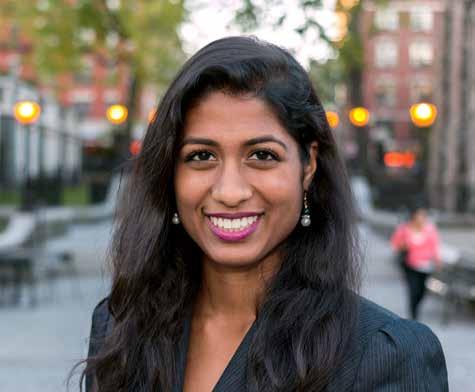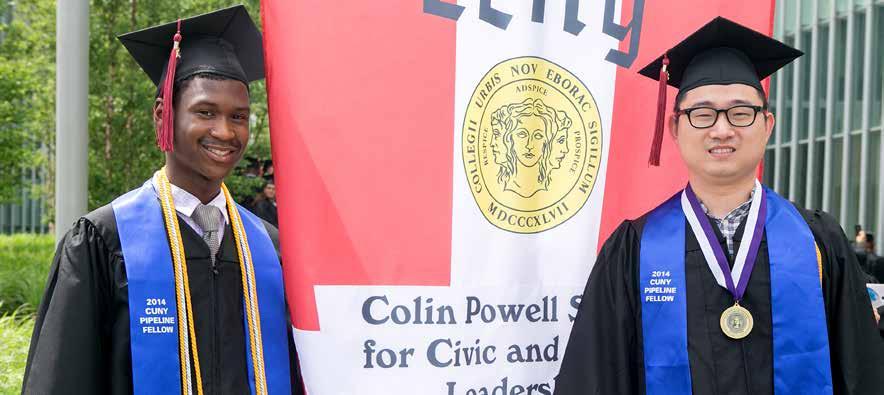
6 minute read
Student Leadership
Building Leaders at the Colin Powell School
Our approach to leadership begins with a commitment to agency—the decision to act with purpose, stay informed, and seize the moment. For many of our students, it means wresting a life from potential drift, discovering a path of meaning, and, in the words of Dean Boudreau, “authoring a new and better future.”
Advertisement
Chayanne Marcano
Chayanne Marcano, an anthropology major, is a firm believer that the study of anthropology encourages students to think about their own positionality when discussing topics like race, gender, and sexuality. Themes within the major help students better understand its history and acknowledge its colonial origins. “To know that is comforting to me, because I believe that our experiences and beliefs inform and shape our research. It doesn’t always have to be overt; it can be a subtle influence,” says Marcano.
After graduation, Marcano hopes to go on to study at the graduate level, with a research focus on the intersections between race and public space. “Being a part of not only the Colin Powell School and CCNY, but the CUNY network in
general, has granted me so many great experiences.” This past summer, as a Mellon Mays Undergraduate Fellow, Marcano participated in a research-training program at the University of Chicago—while demanding, this program affirmed her dreams of becoming an academic. The program was structured to feel like graduate school, and pushed students to produce research proposals that they presented at a symposium at the end of the program. Marcano’s research focused on the link between the political economy of the city and representations in communitybased museums. Putting this together, while also connecting with Mellon Mays Undergraduate Fellows across the nation, was amazing.
Suprita Datta
Even at a young age, Suprita Datta knew that service to others would always play an important role in her life. Understanding people, their communities, and the things they hold dear were key to Datta’s learning about the realities people face in life. As a Colin Powell fellow in the Dobrich New Americans Program as well as a William R. Kenan Scholar at the Macauley Honors College at City College, Datta has made scholarship and service hallmarks of her time on campus. As a part of the Roosevelt Institute of Public Policy at City College, she has learned how public policy is constructed and how to deal with different stakeholders and their interests. This lesson was particularly relevant and instrumental in understanding how foreign policy is created and the different considerations that must be taken into account. This past summer, Datta interned at the State Department and worked on Middle East and North Africa foreign policy issues, supplementing her extensive educational knowledge of the Middle East, public policy, and U.S. foreign policy with the real-world initiatives developed by the State Department. “When I started college, it was important for me to apply my education outside the classroom and learn from people as well,” says Datta.


DANIEL ROBLES
As a student in the MA program, Robles does EEG research in order to study substance abuse and the role of extraneous cues in drug craving behavior. He has spent time collecting data from the urban New York population and has presented, along with his laboratory team, preliminary works in various conferences in the USA and Europe. Robles is also doing research coordination and working as an Adjunct Lecturer in the psychology department at the Colin Powell School.
Robles chose the MA program because of his interest in cognitive neuroscience research and his desire to be in direct contact with many professors whose research and work inspired him since he was an undergraduate student. He plans to extend and enhance his research skills in order to pursue a Ph.D. in Neuroscience and go on to a career in substance abuse research.
“As a psychologist I’ve been deeply attracted to the idea of portraiture and capturing a particular moment in space and time where subtle aspects of personality emerge in front of the observer. Recently, I’ve been working on a personal project capturing the darker side of addiction and its chaos in the streets.”
GINGER ALBERTSON
Rethinking development strategies to close gender gaps is the foundation of the research Ginger Albertson has conducted for her masters thesis in international relations. With the persistent disconnect between program goals and implementation, Albertson sought to understand practical methods being used to empower women in international development and how such methods might change. In 2015, she lived and conducted research in Cambodia for four months to investigate the work of international development agencies, local governmental ministries and nongovernmental organizations (NGOs), working on ways to improve the status of women. Since conducting undergraduate work in international studies at the Colin Powell School, Albertson has been interested in humanrights issues, specifically in women’s and children’s rights. After graduation, Albertson plans to continue working on gender and youth issues at an international or nonprofit agency.


Sebastian Cordoba
Sebastian Cordoba emigrated from Colombia to the United States ten years ago. After graduating from California State University, Long Beach, with a BA in human development, he spent a year in South Korea and almost two years in Japan teaching English and learning the languages. As an English teacher, he became intrigued by the psychology of intercultural and linguistic processes connected to sexual identity, and the diverse reactions different individuals have in cultural settings distinct from their own. In 2014, Cordoba moved to New York City to pursue his MA in general psychology.
At CCNY, Cordoba has been able to explore and deepen his understanding of psycholinguistic processes while also gaining a solid, empirical, and comprehensive understanding of the brain processes that influence them. Cordoba has been fascinated by the intersection of language and sexual identity, which he is currently exploring for his master’s thesis.
Taking the thesis route in the general psychology master’s program has created many academic opportunities for Cordoba, who is applying to doctoral programs in Germany for next year.
“Teaching is one of my passions, and to have an opportunity to be a teaching assistant at the Colin Powell School gave me an opportunity to work with students in both ‘Applied Statistics’ and ‘Psychology in the Modern World.’ These students, all undergraduates, are doing truly impressive research.”
Reggie Romain
Reggie Romain was born and raised in Brooklyn, New York, the youngest of three children of Haitian immigrants. The Colin Powell School’s 2015 salutatorian, Romain graduated in May, with honors, with majors in both psychology and sociology. While at the Colin Powell School, Romain researched “motivation and employee attendance behaviors.” A member of the CUNY Pipeline Research Fellowship at the Graduate Center, where he researched coworker relations, Romain will begin a masters of arts program in industrial organizational psychology and organizational behavior at Brooklyn College and plans to continue to research counterproductive behaviors among employees.
Chunbiao Wang
For Chunbiao Wang, emigrating to the United States from China in 2009 was an exciting transition. That excitement motivated him to seek out as many opportunities as possible to settle into his new home, and extended to his arrival on the City College campus a year later. During his time on campus, Wang applied for, and was accepted to both the City College Fellows Program and the Pipeline Research Fellowship at the Graduate Center. Both awards provided him academic and financial support and ensured that he could direct his time to completing majors, with honors, in economics at the Colin Powell School and mathematics in the Division of Science at City College. Wang, the Colin Powell School’s 2015 valedictorian, gave a moving speech at this year’s commencement, saying, “The Colin Powell School feels like home, and the faculty, staff and students here feel like my family.” Wang will continue his studies and research in graduate school starting in the fall of 2016.







